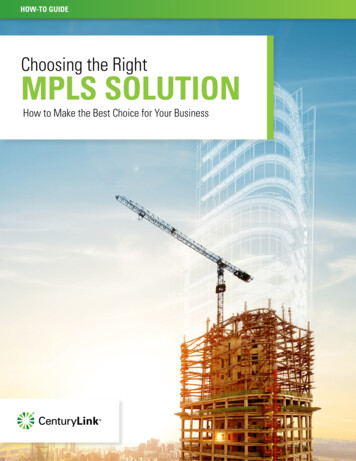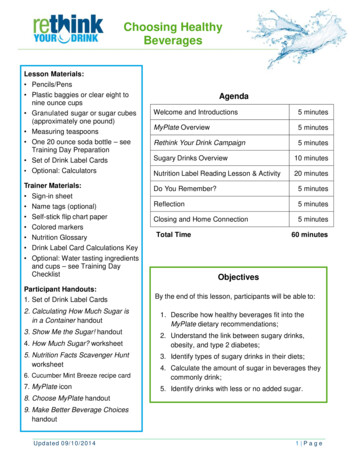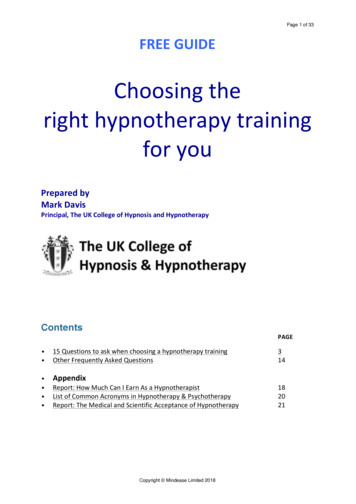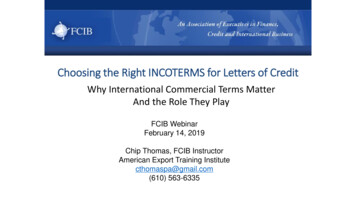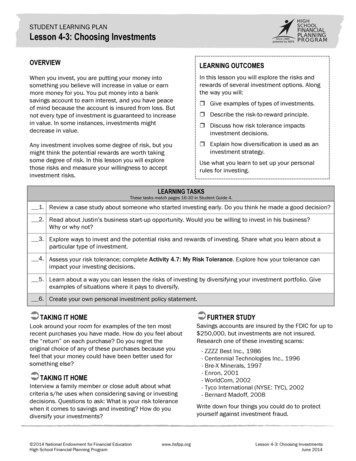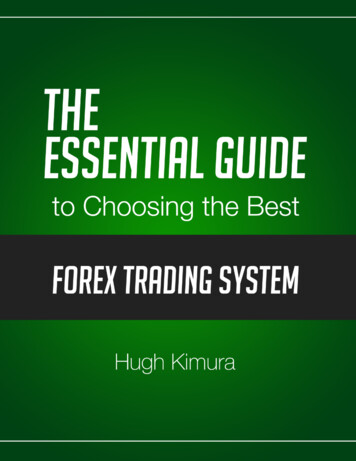
Transcription
The Essential Guide to Choosingthe Best Forex Trading SystemHugh KimuraTrueLiving Media LLCCopyright 2017
All rights reserved. No part of this publication may be reproduced, distributed, ortransmitted in any form or by any means, including photocopying, recording, or otherelectronic or mechanical methods, without the prior written permission of the publisher,except in the case of brief quotations embodied in critical reviews and certain othernoncommercial uses permitted by copyright law. Trading currencies (or any otherfinancial market) involves substantial risk, and there is always the potential for loss. Yourtrading results may vary. No representation is being made that any associated adviceor training will guarantee profits, or not result in losses from trading. Some links in thisbook may be affiliate links, but we only recommend products that we believe in. Allcontent in this book is for informational purposes only. Before deciding to invest inForeign Exchange (or any other financial market), you should carefully consider yourinvestment objectives, level of experience, and risk threshold. You could sustain a lossof more than your initial investment. You should be aware of all the risks associatedwith foreign exchange trading, and seek advice from an independent certified financialadviser if you have any doubts.
Table of Contents1. Busted! The 5 Biggest Trading System Myths2. Get Your Ticket to Ride on the Trading Silodrome3. 3 Questions to Figure Out Your Trading Personality4. How to Develop Confidence in a Trading System5. Leverage Trading System Alchemy6. Tame Your Monkey Mind7. Where to Go From Here
Chapter 1Busted! The 5 Biggest Trading System Myths“I don’t have to have faith, I have experience.”- Joseph Campbell, The Power of MythAlmost everyone who wants to become a successful trader beginstheir journey in exactly the wrong place.Myself included.Aspiring traders usually choose a trading system based on one of the fivemyths in this chapter.There are so many conflicting opinions about what is the best way totrade, that it’s almost impossible for the beginning (or even somewhatexperienced) trader to figure out what is real and what is marketing hype.So don’t be surprised if you think that the material in this book seems alittle controversial. It’s not meant to be.What I’m about to share with you is the result of 10 years of research,personal trading experience and learning from professional traders.While I firmly believe that all profitable traders understand the conceptsoutlined in this book, not all of them are great at teaching them in a waythat is easy to understand and implement.That is where I believe this book can be of great help on your tradingjourney.But before we get into the specific steps that I have seen work time andtime again, I believe that it is vital to understand some of the myths aboutlearning to trade and how they can prevent you from succeeding.
Myth #1: You Need to Have the Most Profitable TradingSystem AvailableYou could give 100 traders the exact same trading system, with veryspecific rules, let them trade it for 6 months, and every single one ofthem will have different results.This is because every trader will trade it differently and some traders simplywon’t be able to follow the rules, usually due to conflicting personal beliefs.So the key to choosing the “best” trading system to find one that fitsyour unique personality.Let me repeat it again because that is the most important sentence in thisentire book You will only succeed in trading when you find a trading method thatmatches you! Not the guy on YouTube, not your neighbor and not WarrenBuffett.YOU!The only way to do this is to learn different systems, figure out yourTrading Personality, test those systems thoroughly, gain confidence in asystem you like the best and custom tailor it to your beliefs all beforerisking any real money.I’ll get into how to do that later in this book.But I want you to remember that many traders do very well and managemillions of dollars, trading a system that is not the most profitable systemin the world.Myth #2: A Trader’s Track Record is the Only Thing ThatMatters When Choosing a Trading Strategy
Some students will choose a trading course solely based on the trackrecord of the trader teaching the course. This can be a good indicator of ifa system works or not.But it’s not the only indication of if you should buy a course, follow a freesystem on the internet or pay for a mentoring program.I had a soccer coach in high school that played for the Columbian NationalTeam. Even in his 50’s he was still a phenomenal player.However, he could not effectively teach us what he knew. He would alwaysget frustrated because it was easy for him so why was it so hard for us?You get my meaning here. I’m sure you have had a similar experience, atsome point in your life.The best traders aren’t necessarily the best teachers. On the flip side,some people are better at teaching than they are at trading.If you are interested, you can read my blog post about it here. The bottomline is that a track record shouldn’t be your only trading system selectioncriteria.Myth #3: You Need to Follow the Rules of a TradingSystem ExactlyWhen you are first learning a trading system, you should follow the rules,as they are written. This is so that you have a good understanding of howthe system works and what might need to be changed.Hey, it might work for you as-is.However, most of the time, you are going to have to tweak a tradingsystem to make it work for you. Sticking to all of the rules religiously,when they don’t work well for you, is a recipe for disaster.This book will show you how to tell when you should follow the rules andwhen you should change them.
Sometimes you are just one tweak away from profitable trading.Myth #4: Trading Psychology Doesn’t MatterYou can usually spot a newbie trader from a mile away. They are the oneswho are looking for the best trading systems.More skilled traders are always looking for ways to improve their tradingpsychology. If you don't believe me, listen to interviews with professionaltraders.They will almost always emphasize psychology over systems. The truth isthat, with the right psychology, you can probably trade several differentsystems very well. But without the right psychology, you won’t succeedwith even the most robust trading system.Myth #5: Anyone Who Charges Money to Learn TheirTrading System Must be a ScamThis one blows my mind.You pay a lot of money for college to learn how to get a good job. You payfor online courses to learn how to do computer programming. You pay agood coach to learn how to play golf.So why do people think that learning how to trade is any different?One of the most common questions I get from people learning totrade is: if a trader is making so much money trading, then why do theyhave to teach too?Well, as everyone who has ever traded knows, there are ups and downs intrading. It’s like any other business, there will be good times andchallenging times.Therefore, anyone who owns a business will want to create as manycashflow sources as possible. So when one source is not doing well, theother ones will take up the slack.
When traders want to smooth out their income, an education business is agreat option. Other traders invest in real estate, buy brick and mortarbusinesses and trade collectables. Why should an education business beany different than those other investments? The reality is that it makes alot of business sense for traders to teach too.Now that we’ve dispelled some of the myths about trading systems, let’stake a quick look at what can happen when you don’t follow the guidelinesin this book.
Chapter 2Get Your Ticket to Ride on the TradingSilodrome“The Wall of Death, motordrome, silodrome or Well of Death isa carnival sideshow featuring a silo- or barrel-shaped wooden cylinder, typicallyranging from 20 to 36 feet (6.1 to 11.0 m) in diameter and made of woodenplanks, inside which motorcyclists, or the drivers of miniature automobiles, travelalong the vertical wall and perform stunts, held in place by friction and centrifugalforce.”- WikipediaThe Trading Silodrome is fun in the beginning.You hop from trading system to trading system, looking for the “holy grail.”You feel like you are making progress because you are always learningsomething new.
As I mentioned before, you need to do a certain degree of exploring, if youare going to find the right trading system for you. But if you don’tunderstand what you should be looking for in these trading systems,then you will probably waste years of your life, going around in circles.The Trading Silodrome usually goes like this: Learn a new trading systemDream about the Ferrari you are going to buyTrade the system in a demo account for two weeks and make moneyTrade it in a live account and lose moneyYou conclude that it doesn’t work and look for a new trading systemRinse and repeatMany traders literally keep going through this vicious cycle until they loseall their money, or give up out of frustration.I want to help you avoid this terrible fate.So in the next chapter, I will give you three simple questions that you haveto ask yourself, every time you learn a new trading system. This will helpyou understand which trading methods you need to learn more about andwhich ones you should avoid.If I knew these three questions when I first started trading, it would havesaved me years of frustration and headache.
Chapter 33 Questions to Figure Out Your TradingPersonality"He who asks a question is a fool for five minutes; he who does not ask aquestion remains a fool forever." - Chinese proverbNow that you understand that the “best” trading system is one thatmatches your personality, how do you figure out which trading systemswill fit you?That’s where these three questions are so valuable.Yes, you will need to try out a few trading systems before you canunderstand which ones are a good match for you and which ones have nochance of ever working.So as you try out different trading systems, ask yourself thesequestions:1. What is the best timeframe for you to trade on? Is it intraday, swingtrading or long-term position trading?2. Are you more of a technical trader or a fundamental trader? If youare more of a technical trader, are you better at trading with thetrend, against the trend or trading breakouts?3. How much are you really comfortable risking on each trade?Let’s take a look at each of these questions individually and why they areso important What is the best timeframe for you to trade on?
The primary timeframe you trade on is going to play a big role indetermining if you are going to succeed in trading or not.People are generally predisposed to be better at trading one timeframe, atleast in the beginning. You could be good at multiple timeframes, but thekey is to pick the ONE timeframe that you have the best chance ofsuccess with. Once you master it, then you can move on to others.A couple of things to keep in mind: What is your daily schedule like? If you have a day job, you shouldconsider swing trading or position trading. If you find out that you arebest at day trading, then you can setup a schedule to trade for acertain amount of time, before or after work. You may think that you are better suited to one timeframe, whenin reality, you should be trading another timeframe. This is usuallyrelated to a feeling that you need to take more trades. You can almostalways find a way to get more trades on any timeframe, either bytrading more pairs or learning more setups. You may find that certaintimeframes bring out the best or worst in your trading.Are you more of a technical trader or a fundamentaltrader? If you are more of a technical trader, are youbetter at trading with the trend, against the trend ortrading breakouts?Alright, you got me. That’s actually two questions.But they need to be asked together. Like with trading timeframes,people generally lean towards technical or fundamental analysis.You can use both at the same time, but it is important to understand whichone you are more comfortable with. Even if you use a technical approach,you might use 90% technicals and 10% fundamentals.Don’t get too caught up in the exact mix. Just understand which one youwill rely on more.
If you are a better technical trader, figure out if you are more comfortablewith breakout trading, trend trading or counter trend trading. Again,you might be good at more than one.But master one, before you move on to others.How much are you really comfortable risking on eachtrade?Your risk on each trade can make or break a trading system. Youshould consider this question carefully because a trading system mightotherwise be a perfect fit for you, but if you are taught to risk 2%, and youare only comfortable risking 0.5% per trade, then you will probably freakout when you lose.Ultimately, this stress will get to you and you will give up on what couldotherwise be your ideal trading system.In reality, you might simply have to adjust how much you risk per trade, tobe able to trade the system successfully. This may seem too simple, but itreally works.A word of warning here Trading in a demo account might not give you a realistic feel for theamount of risk that is right for you. So if that is the case, before you putyour entire trading account at risk, first try opening a very small account ata broker that allows you to trade nano lots.This will allow you to test different risk levels and figure out which one youare most comfortable with. Obviously, it is up to you to decide how muchis a “small amount” and if you should be risking real money at all. I wouldsay that the minimum for this type of account is 100, but it’s your call.You can still risk 1% or less with a nano lot broker and a 100 account.Here are some common risk levels that traders use: 0.25% 0.50%
1% 2%Those are good levels to start testing. Also set
Sometimes you are just one tweak away from profitable trading. Myth #4: Trading Psychology Doesn’t Matter You can usually spot a newbie trader from a mile away. They are the ones who are looking for the best trading systems. More skilled traders are always looking for ways to improve their trading psychology. If you don't believe me, listen to interviews with professional traders. They will .



